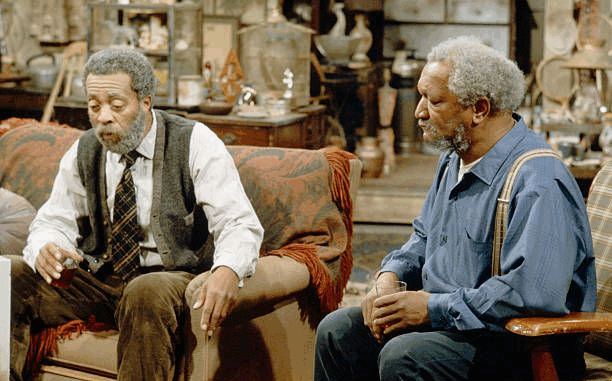
He staggered onto the screen with a bottle in hand, wild-eyed, and absolutely unforgettable. Ned the Wino, the eccentric, perpetually drunk neighborhood fixture on Sanford and Son, wasn’t a main character — but he became a fan favorite thanks to the genius of Raymond Allen.
His portrayal of Ned was so convincing, many thought the actor was a real alcoholic. But the truth about Allen’s life — and his silent, painful exit from the spotlight — is far more heartbreaking than fans ever imagined.
Raymond Allen, who also played Aunt Esther’s husband Woody, was a comic powerhouse. Despite limited screen time, his physical humor, slurred wisdom, and unpredictable entrances always drew a laugh. Behind the scenes, he was known as a gentle soul, deeply professional, and immensely proud of his craft.
Yet while other cast members of Sanford and Son moved on to new projects and higher fame, Allen’s career slowly disappeared. The reason? A debilitating illness that quietly stole his strength and mobility.
In the early 1980s, Allen was diagnosed with a severe neurological condition that caused progressive nerve damage. It became increasingly difficult for him to walk or perform. Roles dried up. His name faded from scripts. And eventually, Hollywood stopped calling.
For years, Raymond Allen lived in near-anonymity, dependent on care and far removed from the industry that once embraced his wild-eyed genius. He never publicly complained. He rarely gave interviews. In fact, many younger fans of Sanford and Son didn’t even know he was still alive.
But the tragedy deepened in 2020 when Allen quietly passed away in California at the age of 91.
His death barely made headlines. No network specials. No widespread tributes. Just a few nostalgic social media posts from longtime fans and colleagues — and a lingering sadness that a man who brought so much joy could disappear so completely from the cultural memory.

Demond Wilson, who played Lamont, spoke briefly about Allen’s passing in an online forum, saying, “Raymond was one of the good ones. He made people laugh, and he never asked for more than his chance to work. He deserved more.”
Those who worked closely with Allen remembered him as humble, warm, and refreshingly ego-free. He was always grateful just to be part of the show. And despite the character of Ned being deeply flawed, Allen made him lovable — even oddly profound.
Some fans have since revisited Allen’s scenes, discovering a kind of tragic beauty in Ned the Wino’s chaotic persona. Beneath the slurs and staggering steps, there was a man who represented the forgotten, the marginalized — brought to life by an actor who would, in a cruel twist, end up similarly forgotten.
Today, there are quiet efforts by fans to campaign for a proper tribute — a documentary, a retrospective, even a scholarship in Allen’s name. Because although he never received the Emmy recognition or Hollywood accolades, Raymond Allen gave the world something rare: laughter that lingered long after the episode ended.
In the end, he didn’t just play Ned the Wino. He became a symbol of overlooked brilliance. And now, fans old and new are finally beginning to realize what was lost the day Raymond Allen took his final bow — not just a funny man, but a master of the small, soulful performance.